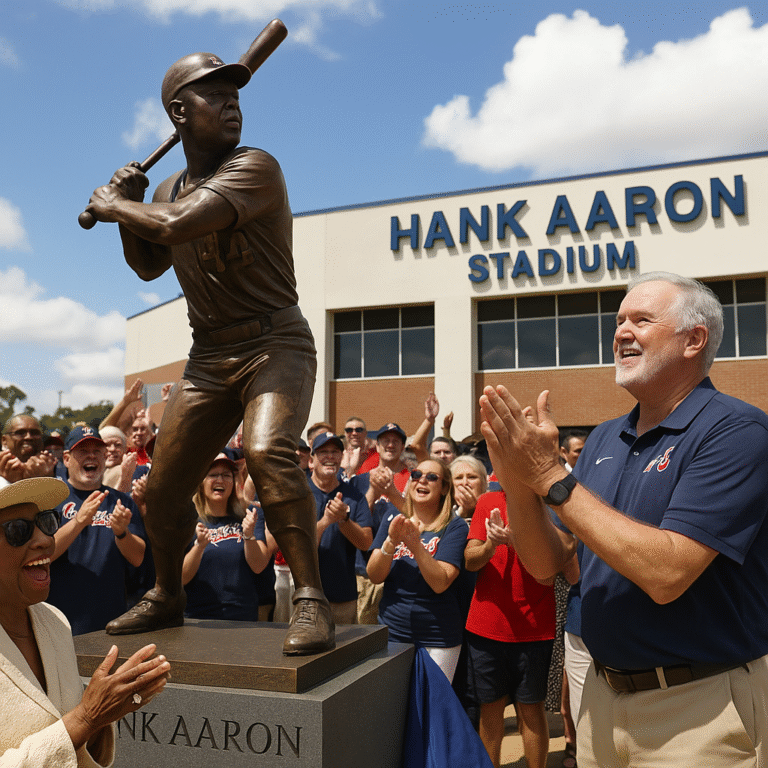Atlanta Braves Legend Hank Aaron Honored with Statue in His Hometown
In an emotional and historic tribute, a statue of baseball legend Hank Aaron has been unveiled in his hometown of Mobile, Alabama, immortalizing one of the greatest players in Major League Baseball history. The unveiling ceremony, held at Hank Aaron Stadium—also known locally as “The Hank”—brought together family members, former teammates, civic leaders, and hundreds of fans who gathered to pay their respects to a man who transcended sports to become a national symbol of excellence, dignity, and perseverance.
A Monument to Greatness
The bronze statue, which captures Aaron mid-swing in his iconic Atlanta Braves uniform, stands as a lasting testament to his contributions on and off the baseball field. Sculpted by renowned artist Ed Dwight, the statue is both lifelike and symbolic, reflecting the strength, grace, and humility that defined Aaron’s legacy.
“This is not just a statue of a baseball player,” said Mobile Mayor Sandy Stimpson during the unveiling. “This is a monument to a man who broke barriers, who overcame hate with grace, and who gave our city a name that the world will never forget.”
The location of the statue outside the stadium where Aaron’s career was first celebrated in Mobile is fitting. It is the same place where many aspiring young athletes now dream of following in his footsteps. The new statue is surrounded by a small memorial garden and an inscription of Aaron’s most famous quote:
“I had to learn early in life that I had to work harder than the next guy just to make it. And I did.”
A Career Like No Other
Hank Aaron, born Henry Louis Aaron on February 5, 1934, rose from humble beginnings in segregated Mobile to become a titan in baseball. He made his major league debut in 1954 with the Milwaukee Braves, who later became the Atlanta Braves. Over the next 23 seasons, Aaron would compile one of the most impressive résumés in baseball history.
He is best remembered for breaking Babe Ruth’s home run record, hitting his 715th career home run on April 8, 1974. Aaron finished his career with 755 home runs, a record that stood for more than three decades. But he was more than just a power hitter—he finished with over 3,700 hits, 2,297 RBIs (a record that still stands), and maintained a .305 batting average.
Despite the racism and death threats he faced—particularly as he neared Ruth’s record—Aaron never responded with anger or malice. His quiet strength made him not only a sports hero but a civil rights icon.
Family and Fans Pay Tribute
Aaron’s widow, Billye Aaron, delivered an emotional speech at the ceremony, calling the statue “a tribute to the spirit of a man who carried the hopes of a generation.”
“Hank always said he wanted to be remembered not just for what he did with a bat, but for how he treated people,” she said. “This statue will stand as a reminder that greatness is not just about numbers—it’s about character.”
Former Atlanta Braves teammates like Dale Murphy and Tom Glavine attended the event, praising Aaron not just for his athletic accomplishments but for the personal mentorship he offered to younger players. “Hank was the kind of guy who looked you in the eye, gave you his full attention, and made you believe you belonged,” Murphy said.
Community Impact and Education
The statue unveiling was more than a tribute—it was part of a broader initiative to inspire the next generation. As part of the dedication, the city of Mobile also announced the creation of the Hank Aaron Legacy Scholarship, which will be awarded annually to outstanding high school athletes and scholars in the area who demonstrate leadership and community involvement.
Additionally, local schools will now incorporate Aaron’s story into Black History Month programs, and a mobile museum exhibit detailing his life and legacy will tour Alabama and the southeastern U.S. beginning in fall 2025.
“These efforts ensure that Hank’s story will be told not just through baseball statistics, but through lessons of courage, humility, and resilience,” said Mobile County School Superintendent Chresal Threadgill.
National Attention and Praise
The tribute has drawn praise from across the country. President Joe Biden released a statement applauding the community for “honoring an American hero whose perseverance inspired generations.” The MLB Commissioner’s office also announced that the league would partner with the city of Mobile on future community baseball programs.
Aaron, who passed away in January 2021 at age 86, had previously been honored by the Braves and MLB with statues and awards, including the Hank Aaron Award, given annually to the best offensive player in each league. But the Mobile statue, rooted in the soil of his childhood, holds unique emotional resonance.
A Legacy Etched in Bronze
As the sun set over “The Hank” and a youth baseball team took to the field for a commemorative game, visitors lined up to take photos beside the new statue. For many, it was a moment not just of reflection, but of gratitude.
One young fan, no older than 10, looked up at the bronze figure and said to his father, “I want to be like Hank.”
And maybe that’s the most powerful tribute of all.
Hank Aaron may be gone, but in the hearts of Mobile and the nation, he still swings, still inspires, and still reminds us all that greatness comes not just from talent—but from how one chooses to live.
